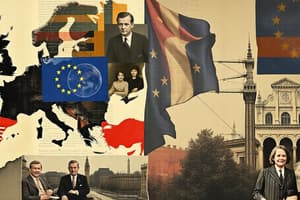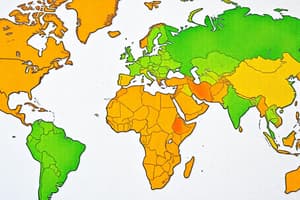Podcast
Questions and Answers
What distinguishes a nation-state from a general state?
What distinguishes a nation-state from a general state?
- A state is solely defined by its government.
- A nation-state is a type of international organization.
- A state has defined borders.
- A nation-state has a common identity among its people. (correct)
Which of the following correctly describes international organizations?
Which of the following correctly describes international organizations?
- They consist of member-states working toward common global goals. (correct)
- They are focused solely on economic issues.
- They operate independently of government influence.
- They only represent the interests of individual states.
What is a primary role of the International Monetary Fund (IMF)?
What is a primary role of the International Monetary Fund (IMF)?
- To provide military support to member countries.
- To promote cultural exchange between nations.
- To stabilize economies through financial support and advice. (correct)
- To dictate the laws of member countries.
Why is the statement that international organizations are merely an amalgamation of various state interests considered a fallacy?
Why is the statement that international organizations are merely an amalgamation of various state interests considered a fallacy?
Which of the following is NOT a characteristic of a state?
Which of the following is NOT a characteristic of a state?
What is one function of the World Bank?
What is one function of the World Bank?
Which of these statements best describes the nature of nations?
Which of these statements best describes the nature of nations?
What best explains the role of powers in shaping ideas and behaviors?
What best explains the role of powers in shaping ideas and behaviors?
What is the primary function of global governance?
What is the primary function of global governance?
Which of the following organizations is primarily concerned with global health issues?
Which of the following organizations is primarily concerned with global health issues?
How does global governance influence globalization?
How does global governance influence globalization?
What is a defining characteristic of a nation-state?
What is a defining characteristic of a nation-state?
What best differentiates a nation from a nation-state?
What best differentiates a nation from a nation-state?
Which of the following roles does the International Monetary Fund (IMF) play in global governance?
Which of the following roles does the International Monetary Fund (IMF) play in global governance?
Which statement about global governance is FALSE?
Which statement about global governance is FALSE?
What role do organizations like the World Trade Organization (WTO) serve in global governance?
What role do organizations like the World Trade Organization (WTO) serve in global governance?
What is the primary role of international organizations in the context of classification?
What is the primary role of international organizations in the context of classification?
How do international organizations gain credibility when fixing meanings of key concepts?
How do international organizations gain credibility when fixing meanings of key concepts?
What constitutes the power to diffuse norms in international organizations?
What constitutes the power to diffuse norms in international organizations?
Which of the following is a positive effect of international organizations?
Which of the following is a positive effect of international organizations?
What is a potential negative effect of international organizations?
What is a potential negative effect of international organizations?
In what way does the power of classification influence international relations?
In what way does the power of classification influence international relations?
Why is the power to fix meanings essential for international organizations?
Why is the power to fix meanings essential for international organizations?
What role do international organizations play in the diffusion of norms?
What role do international organizations play in the diffusion of norms?
Flashcards are hidden until you start studying
Study Notes
Global Governance
- Global governance encompasses systems and processes managing international relations and global issues.
- It coordinates actions among countries and actors to create order and resolve cross-border challenges.
- Intersecting processes include international agreements, regulations, and cooperative actions among diverse stakeholders.
- It shapes globalization by establishing rules, norms, and standards for trade, security, and environmental policies.
Key International Organizations
- United Nations (UN): Focuses on peace promotion, human rights, and sustainable development.
- International Monetary Fund (IMF): Aims to stabilize global economies through financial assistance and advice.
- World Bank: Offers funding for development projects to reduce poverty and promote economic growth.
- World Health Organization (WHO): Addresses global health issues and aims to improve global health standards.
- World Trade Organization (WTO): Regulates international trade rules and facilitates global trade cooperation among nations.
Nation-State
- A nation-state consists of a defined territory, government, and a population sharing a common identity or culture.
- It is a political entity where the nation (people) and the state (governing body) are intertwined.
Nation
- A nation is a large community sharing common traditions, languages, or cultures, representing a shared identity.
State
- A state refers to a defined political entity with its own government and enforcement of laws.
- Differentiates from nation-states by being a broader term that can encompass various political entities.
International Organization
- International organizations (IOs) are composed of member-states collaborating on global issues.
- Typically intergovernmental, facilitating cooperation across different governments and countries.
Fallacy of International Organizations
- The view that international organizations are merely a reflection of state interests oversimplifies their complex roles.
- Organizations like the IMF base policies not solely on state interests but also on expert analysis and research.
Power of Classification
- IOs have the authority to create categories that shape global norms and standards, influencing international approaches to issues.
- This power aids in establishing benchmarks that guide behaviors and policies among countries.
Power of Fixing Meanings
- Ability to define key concepts (e.g., "security," "development") provides IOs with credibility as authoritative sources.
- Clear interpretations ensure consistent application of critical ideas across different contexts.
Power of Diffusing Norms
- Involves spreading accepted behavioral codes that guide actions, even without formal legal backing.
- Generates consistency in how individuals and nations interact on a global scale.
Effects of International Organizations
- Positive Effects: Promote essential global norms like environmental protection and human rights, as seen with the UN's climate change initiatives.
- Negative Effects: Can contribute to adverse outcomes through ineffective policies or unintended consequences, highlighting the challenges within IO operations.
Studying That Suits You
Use AI to generate personalized quizzes and flashcards to suit your learning preferences.




